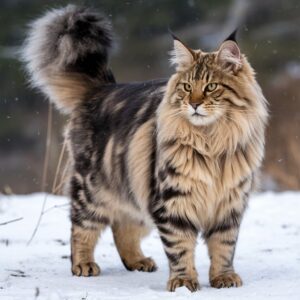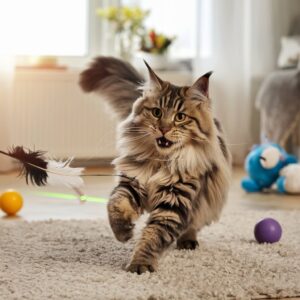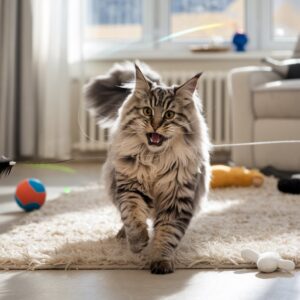Ultimate Guide to Caring for Your Majestic Maine Coon Cat
The Maine Coon cat stands out as one of the most fascinating breeds, renowned not only for its impressive size but also for its charming features and engaging personality. Originating from the enchanting state of Maine, these cats are perfectly adapted to withstand cold climates, showcasing their beautiful thick, bushy tails that resemble cozy winter scarves, alongside their tufted ears that add an extra layer of allure. Their luxurious fur comes in a dazzling array of colors, further enhancing their majestic appearance. However, it's their robust physique, characterized by powerful, large paws, that plays a crucial role in their survival in harsh environments. With a resemblance to small lions, Maine Coons are not only stunning companions but also resilient survivors, uniquely equipped to thrive even in snowy landscapes.
Maine Coons are celebrated for their captivating personality traits, which draw people in like magnets. Their social nature often reminds many of dogs, leading to the delightful description of them as having dog-like characteristics. This observation is not merely anecdotal; it reflects their unwavering loyalty and affectionate demeanor, making them stand out among feline companions. When a Maine Coon decides to bond with you, it truly feels like winning a jackpot in the realm of pet companionship! Beyond their affection, these cats exhibit remarkable intelligence and a playful spirit. Watching a Maine Coon navigate a puzzle toy is akin to witnessing a chess match in action, beautifully demonstrating their ability to strategize and solve problems in a mesmerizing manner.
Often fondly referred to as “gentle giants,” Maine Coons possess a calm and serene demeanor that may lead you to underestimate their playful side. At their core, they are natural adventurers, embodying the curious energy of children with seemingly boundless enthusiasm. It’s common to catch a Maine Coon gazing at you with their insightful, almost mysterious eyes before they spontaneously spring into action, playfully knocking over household items with the exuberance of tiny furry wrecking balls. Their vocalizations are notably unique, opting for chirps and trills rather than typical meows, creating an ongoing dialogue that expresses their thoughts on everything from their latest meal to the weather outside.
With their striking combination of robust physical traits, sharp intellect, and engaging personalities, Maine Coons truly represent an extraordinary breed. Their exceptional nature has earned them a prominent place in the hearts of cat enthusiasts everywhere. Each Maine Coon is like a rare gem, possessing its own distinct personality and quirky habits, always managing to surprise you just when you think you’ve figured them out.
Essential Tips for Maine Coon Cat Owners
- Maine Coon cats are highly regarded for their large size, friendly nature, and exceptional intelligence, making them the perfect companions for families in search of a loving pet.
- Providing a balanced diet that is rich in high-quality protein and ensuring adequate hydration is crucial for preserving the health and vitality of Maine Coon cats.
- Establishing regular grooming routines, including brushing and nail trimming, is essential to keep the Maine Coon's thick, water-repellent coat in top-notch condition.
- As lively and playful animals, Maine Coons need a wealth of toys and opportunities for physical activity to promote their overall well-being.
- Routine veterinary visits and vaccinations are vital for monitoring the health of Maine Coon cats, particularly since they may be predisposed to certain genetic health conditions.
 Understanding the Nutritional Needs and Diet Essentials for Maine Coon Cats
Understanding the Nutritional Needs and Diet Essentials for Maine Coon Cats
Feeding your Maine Coon cat is a task that requires thoughtful consideration of their unique nutritional requirements, which can vary based on several factors such as their size—being one of the largest domestic cat breeds—age, and level of activity. Maine Coons typically experience higher energy expenditures compared to standard house cats, which translates to a need for a more substantial food intake. However, it’s not solely about the quantity of food; the quality of their diet is equally crucial. A well-balanced meal emphasizing high-quality protein sources is vital for maintaining their muscle mass and overall health, ensuring that they remain active and vibrant.
Many seasoned cat owners and veterinarians recommend diets that are rich in animal-based proteins, including chicken, turkey, and fish. These protein sources are essential as they provide amino acids necessary for fueling their energy and supporting their significant muscle structure. Additionally, don’t underestimate the importance of fats in their diet! Healthy fats play a crucial role in maintaining the luster and health of a Maine Coon's stunning coat, ensuring it remains shiny and vibrant, akin to a model’s hair after a professional conditioning treatment.
Hydration is another critical aspect of your Maine Coon's dietary needs. These felines can be susceptible to urinary tract issues, making it essential to ensure they have adequate water intake. Always provide your Maine Coon with easy access to fresh, clean water. Some owners have found success in incorporating wet food into their cat's diet, as it not only adds moisture but also introduces variety to their meals, helping to prevent boredom from repetitive kibble. Wet food can serve as an exciting treat that keeps their palate engaged while also aiding in proper hydration.
For those committed to optimizing their Maine Coon's health, consulting with a veterinarian to create a tailored feeding plan can be immensely beneficial. Vets can provide personalized recommendations based on your cat's specific needs, including factors such as age, weight, and any existing health concerns. Regular monitoring of their weight and adjusting their diet as they age or increase in activity level is crucial in preventing obesity, which can be a common issue for these large felines if not properly managed.
In-Depth Grooming and Coat Care Techniques for Maine Coon Cats
Maintaining the stunning coat of a Maine Coon cat requires a commitment to grooming practices that keep their fur in excellent condition while minimizing shedding and reducing the occurrence of hairballs, especially for those long-haired individuals. An effective strategy includes increasing brushing frequency during shedding seasons, which typically take place in the spring and autumn. However, grooming extends beyond just brushing their fur; it’s equally important to pay attention to their eyes, ears, and dental health.
Regularly cleaning their large ears with a veterinarian-recommended solution can help prevent the accumulation of wax and debris, which could lead to more serious health issues if ignored. Be vigilant about any unusual discharge from their eyes; signs of redness or excessive tearing may indicate a need for further investigation by a veterinary professional. Additionally, maintaining excellent dental hygiene is essential; incorporating regular tooth-brushing into your Maine Coon's routine, along with offering dental treats, can significantly lower the risk of periodontal disease, ensuring they maintain optimal oral health.
Engaging in consistent grooming sessions not only supports your Maine Coon's health but also provides an excellent opportunity for bonding. These sessions allow you to spend quality time together, enhancing your pet's comfort and overall well-being while simultaneously fostering a deeper connection between you both.
 Promoting Exercise and Playtime for Maine Coon Cats
Promoting Exercise and Playtime for Maine Coon Cats
Maine Coon cats thrive on regular exercise due to their energetic disposition and playful nature. Engaging in physical activity offers numerous benefits, such as aiding in weight management and providing mental stimulation, which can help reduce the likelihood of behavioral problems arising from boredom. Utilizing feather wands or laser pointers can effectively keep these playful felines entertained and physically active, ensuring they remain engaged and joyful in their play.
Given their natural curiosity and love for exploration, it’s crucial to provide Maine Coons with climbing structures like tall cat trees. These additions to their environment not only cater to their climbing instincts but also promote active play. Establishing a routine that includes dedicated playtime each day can significantly enhance their overall happiness and well-being. Maine Coons particularly enjoy games that challenge their intellect, such as puzzle feeders or treat-dispensing toys that require them to think critically and solve problems, providing both mental and physical challenges.
Regular physical activity not only helps maintain their physical shape but also strengthens the bond between you and your Maine Coon through shared activities. Observing their preferences during playtime can help you tailor activities to suit their interests; some may prefer chasing toys, while others might enjoy interactive games that involve their human companions. By creating an enriched environment filled with opportunities for play and exercise, you're contributing to your Maine Coon’s overall happiness and mental stimulation.
Ensuring Comprehensive Health Care and Routine Veterinary Visits for Maine Coon Cats
To guarantee the long-term health and vitality of your Maine Coon cat, prioritizing preventative care and maintaining regular veterinary appointments is essential. Like all breeds, Maine Coons can be susceptible to certain hereditary conditions, including hypertrophic cardiomyopathy (HCM), hip dysplasia, and spinal muscular atrophy (SMA). Scheduling regular veterinary check-ups facilitates the early detection of potential health issues, allowing for timely intervention and effective management.
Beyond routine examinations, preventative measures such as vaccinations, parasite control, and regular blood screenings play a pivotal role in maintaining your Maine Coon's health. It’s equally important for cat owners to remain vigilant regarding their pet's behavior and health at home. Subtle shifts in appetite, energy levels, or elimination habits may indicate underlying health concerns that require further investigation.
Maintaining a healthy weight is crucial for this breed, as obesity can exacerbate or lead to new health problems. By keeping an open line of communication with your veterinarian and educating yourself about the specific health challenges faced by Maine Coons, you can take proactive steps to ensure your pet's health and longevity.
 Creating a Stimulating Environment for Your Maine Coon Cat
Creating a Stimulating Environment for Your Maine Coon Cat
To keep your Maine Coon cat happy and mentally stimulated, creating an enriched living environment is of utmost importance. These intelligent and curious felines thrive when offered ample opportunities for play, exploration, and interaction with their surroundings. Incorporating climbing shelves, engaging toys, and scratching posts can significantly mitigate unwanted behaviors, such as chewing on furniture or excessive scratching, which often arise from boredom.
Maine Coons are naturally inquisitive and relish interacting with new toys and experiences. For those who can offer safe outdoor playtime, consider establishing a “catio” or supervising outdoor excursions to protect them from potential hazards like traffic or aggressive animals. Activities such as hiding treats around the house or setting up small obstacle courses can also be excellent for keeping them engaged and cognitively stimulated, ensuring they are continuously challenged.
By paying close attention to the unique needs of Maine Coons, owners can cultivate a nurturing environment that promotes happy and healthy lives for their beloved pets.
Implementing Effective Training and Socialization for Maine Coon Cats
Training and socialization are essential components in ensuring your Maine Coon cat grows up to be a well-adjusted and joyful companion. Despite their independent nature, these cats are remarkably trainable due to their intelligence and eagerness to please. Basic commands such as “sit,” “stay,” and “come” can be effectively taught using positive reinforcement techniques, including treats and verbal praise, which helps to reinforce desired behaviors.
Initiating training early not only enhances the bond between human and pet but also instills positive behaviors from a young age. Consistency is key; shorter, more frequent training sessions tend to yield better results than longer, infrequent ones. Equally important, especially during the formative months of a Maine Coon’s life, is socialization.
Introducing them to a variety of people, animals, and environments early on fosters confidence and adaptability. Gradually exposing them to new experiences, such as meeting other pets or exploring new locations, can help prevent the development of anxiety or fear as they mature. By focusing on training and socialization from a young age, owners can nurture Maine Coons that are not only affectionate companions but also courageous explorers.
Commonly Asked Questions About Maine Coon Cats
What is the average lifespan of a Maine Coon cat?
The average lifespan of a Maine Coon cat typically ranges from 12 to 15 years; however, some individuals may live well into their late teens with proper care and attention to their health.
What are the grooming requirements for Maine Coon cats?
Maine Coon cats possess a thick, water-repellent coat that requires regular grooming to maintain its condition. It is recommended to brush them at least a few times a week to prevent matting and reduce shedding, ensuring their coat remains healthy and vibrant.
Are Maine Coon cats prone to specific health issues?
While Maine Coon cats are generally robust, they can be predisposed to certain genetic health concerns, such as hip dysplasia, hypertrophic cardiomyopathy, and spinal muscular atrophy. Regular veterinary care is crucial for monitoring their health and addressing any potential issues.
What type of diet is best for Maine Coon cats?
Providing Maine Coon cats with a high-quality, balanced diet tailored to their age, activity level, and any underlying health issues is essential for their well-being. Regularly monitoring their weight and adjusting their diet as necessary can help prevent obesity and associated health problems.
How much physical activity do Maine Coon cats need?
Maine Coon cats are an active, playful breed that greatly benefits from regular playtime and interactive toys to keep them mentally and physically engaged. Providing climbing structures or cat trees is also advantageous for satisfying their natural instinct to explore and climb.
The article: Caring for Maine Coon Cats the Right Way appeared first on Unity Pets.
The Article Maine Coon Cats: The Right Way to Care for Them Was Found On https://limitsofstrategy.com


Your post beautifully captures the Maine Coon’s unique charm and the attributes that make these cats such treasured companions. I’ve had the pleasure of sharing my home with a Maine Coon named Jasper, and your description of their engaging personality truly resonates with my experience.
It’s lovely to hear about your experience with Jasper. Maine Coons really do possess a special mix of quirks and charm that makes them stand out. I find their personalities to be so intriguing—they’re often playful yet laid-back, which creates a nice balance in daily life.
You’re totally right about Maine Coons—they really do come with this delightful combo of playfulness and chill vibes that makes every day feel sort of like a gentle rollercoaster ride. One moment, Jasper’s chasing a laser pointer like it’s the last mouse on Earth, and the next, he’s sprawled out like he’s auditioning for a cat yoga class.
“Click here if you’re ready for a wild ride through the land of delightful distractions!”
https://cnisclub.org/quillbot
I completely agree with you about Maine Coons. Jasper has shown me that unique blend of playfulness and chill vibes you mentioned. It’s fascinating how their personalities can shift from being this big, goofy cat to a serene companion just lounging beside me.
I completely agree with you about Maine Coons. They have such a unique demeanor that really makes them special. Jasper is definitely a character—he loves to chase after anything that moves but knows when it’s time to curl up and just relax. I’ve noticed that his playful side often lightens the mood in our home, especially after a long day.
Jasper sounds like a real gem! Maine Coons have such a knack for fitting right into our lives, don’t they? I love how their personalities can swing from playful goofballs to laid-back cuddle buddies. Has Jasper shown any funny quirks? I’ve heard some Maine Coons can even be a bit dog-like in their loyalty. It’s always cool to hear how they leave their mark on our homes.
It’s great to hear about your experience with Jasper! Maine Coons really do have a way of becoming integral parts of our lives, don’t they? Their personalities are such a delightful mix of playfulness and loyalty. When you think about it, they kind of bring the best of both worlds—being both lively and cuddly, which keeps things interesting every day.
It’s nice to hear your thoughts on Maine Coons and the special role they play in our lives. They really do have a unique charm. Jasper, for instance, has this ability to switch from being a playful whirlwind to a warm cuddle buddy in moments. It’s fascinating how their personalities allow for that blend of energy and coziness.
Absolutely! They’re truly such wonderful companions. If you’re looking to learn more about how to care for these charming cats or connect with fellow Maine Coon enthusiasts, check out this resource!
https://cnisclub.org/quillbot
It’s great to hear that Jasper has brought so much joy into your home. Maine Coons truly have a way of making an impact with their personalities, don’t they? I’ve always found their playful yet laid-back nature so endearing. It seems like they manage to balance being both independent and affectionate effortlessly.
You’ve hit the nail on the head with Maine Coons—these fluffy giants really know how to steal the spotlight. Jasper’s got this remarkable ability to switch from being a playful tornado to a loaf of luxurious fur on the couch in about two seconds flat. It’s like he’s mastered the art of relaxation with a wink of mischief, all while plotting his next escapade.
Your exploration of the Maine Coon cat truly captures the essence of this remarkable breed! I find it fascinating how their physical characteristics not only contribute to their majestic appearance but also their adaptability to the cold. I remember the first time I met a Maine Coon—its size was striking, but what really drew me in was its playful demeanor and that unmistakable sense of personality. They seem to possess a certain charisma that makes them feel so much more like companions than just pets.
It’s interesting how the physical traits of Maine Coons really serve a functional purpose, isn’t it? Their tufted ears and bushy tails not only add to that impressive look but also help them thrive in colder climates. I remember when I first interacted with one as well; the size and those huge paws caught me off guard, but it was their gentle, playful nature that truly made an impression.
It really is fascinating how Maine Coons have evolved to adapt to their environment. Their unique features, like those tufted ears and thick tails, definitely make them stand out, but it’s interesting to think about how these traits have practical benefits. I’ve read that their large paws act like snowshoes, allowing them to traverse snowy terrain more easily.